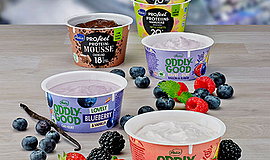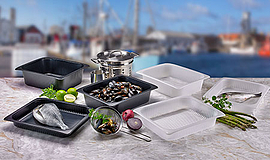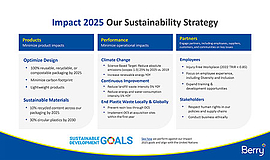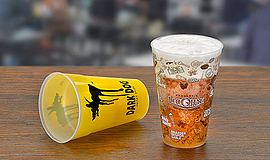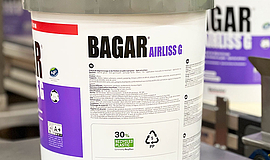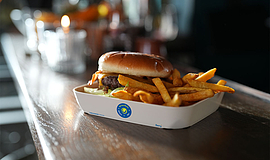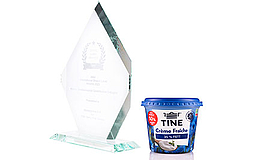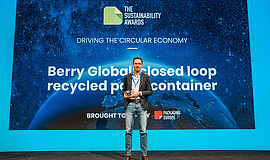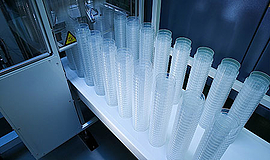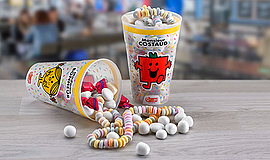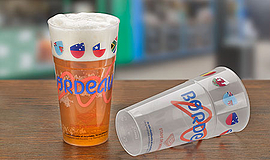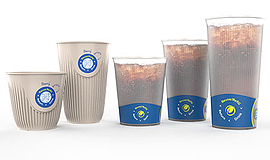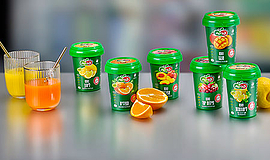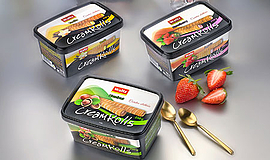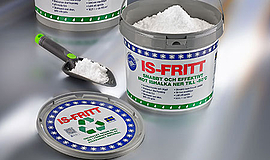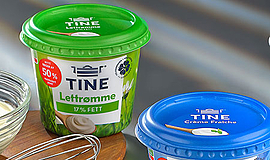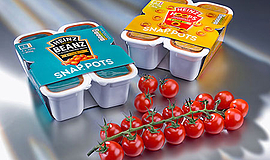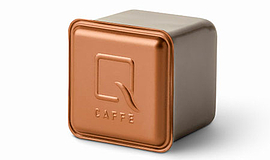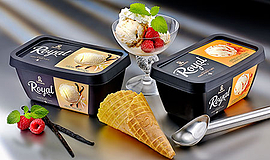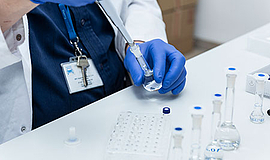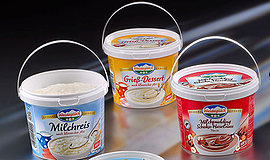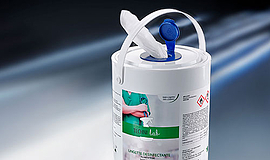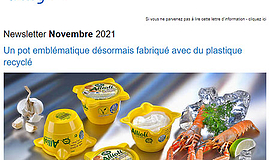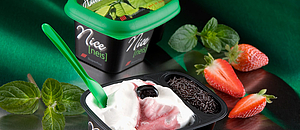-
Packaging for ice cream wins international acclaim
Norwegian ice cream producer Diplom-Is wins the international award for best packaging solution, which is produced by Berry Superfos.
-
Berry Superfos website is moving to a new home soon!
Berry Superfos website will be relocating to our parent company’s website, Berry Global, at berryglobal.com later this year.
-
New pudding pot extends shelf life and saves on plastic
Valio is launching a new pot for its protein puddings. It combines cardboard and plastic with a unique coating to ensure a 120-day shelf life.
-
New versatile tray range
Berry Superfos introduces the ½ Gastro tray range, offering exceptional versatility in depth, volume, and colour, catering to diverse needs across the food industry.
-
Berry Superfos advances circular economy goals with new initiatives
Aiming for 100% reusable, recyclable, or compostable packaging by 2025, Berry Superfos is set to remove metal handles and the colour carbon black in 2024.
-
Renowned brewery chooses the reusable SuperCup
The French brewery Brasserie Licorne, known for its unicorn-themed branding, has opted for the SuperCup for serving its quality beers, ciders and energy drinks.
-
Beissier switches to 30% recycled plastic
French plaster producer Beissier has transitioned one of its product lines to SuperLift® containers made with 30% recycled plastic and featuring the RecyClass label.
-
Berry Superfos launches Reusable Tableware Range for the food service industry
Read about our new revolutionary range of reusable bowls and lids, redefining the way restaurant food is served, enjoyed and packaged.
-
Re-designed cups for dairy producer TINE win their second award
The recyclable sleeve on Berry Superfos cups for TINE, a Norwegian dairy leader, won the 2023 AWA International Award.
-
Berry Superfos wins two more prestigious awards for recycling project
The closed-loop system project by Berry Superfos, aimed at recycling paint containers, has now been honoured with five distinct awards for its innovative circular solution.
-
Berry Superfos leads the way in food safety
Via BRC certification and other measures, we remain committed to maintain high standards of hygiene and quality for food packaging
-
A perfect cup for confectionery and fun
Originally designed for beverages, the reusable SuperCup has just made its debut in the confectionery market.
-
The reusable SuperCup is attending the Rugby World Cup
InfinyCup has partnered with Berry Superfos to equip two major stadiums with the reusable SuperCup for beer and soft drinks during the 10th Rugby World Cup held in France.
-
Elevate your brand with the new reusable Berry Cup Range for hot and cold drinks
Now you can switch from single-use to reusable cups for your brand with the new stylish and functional Berry Cup Range.
-
Bring your next packaging project to life, enhance your creativity and drive packaging innovation with the Berry Superfos 3D Design Studio
Register now to save time and unleash your creativity.
-
Freezer-safe packaging for fruit juice concentrates
Gat Foods, supplier for the global beverage industry, has chosen Berry Superfos as packaging partner for its fruit juice concentrates to ensure freezer safety.
-
We are extremely satisfied with the quality and design of the UniPak container
Bajro Ćatić, CEO of Ćatić Company which recently switched to UniPak for its popular Waltz cream rolls.
-
We decided to stay with the SuperLift® container but change its composition to include recycled content
CEO Alexander Axelsson, Everbrand, about the switch to PCR-content containers for IS-FRITT de-icing products.
-
We want all our packaging to be made of renewable or recycled material by 2025. Our new pot for three of our products is an important step towards this goal.
Bjørn Malm, head of sustainability at dairy company TINE
-
Heinz and Tesco launch pioneering recycling project
Berry Global is part of a first of its kind pilot project launched by Heinz and Tesco to recycle more soft plastics in the United Kingdom.
-
Qbo coffee switches to coffee capsules made from renewable materials
German coffee producer Tchibo chose Berry Superfos to produce coffee capsules made from renewable materials for their Qbo brand.
-
Non-carbon is the new black
Ice cream producer Diplom-Is makes recycling possible by opting for a new non-carbon black colour for its containers.
-
Our customers will benefit from faster testing of raw materials for food product packaging
The new Berry Superfos testing laboratory has obtained accreditation in the field of chemical testing and sampling of plastic products.
-
19% weight reduction for yoghurt and desserts packaging
For sustainability reasons, dairy producer Milchwerke Schwaben joined forces with Berry Superfos to reduce the weight of their 1 kg packaging.
-
Iconic pot for Allioli garlic mayonnaise now includes 25% recycled polypropylene
Food producer Choví launches more sustainable packaging developed in partnership with Berry Superfos
-
The wet wipes container is outstanding: airtight, durable and reusable
Hitam in France is impressed with the design expertise of Berry Superfos.
-
Sign up for our newsletter
Contact us here:

A good way to prevent food waste
Did you know that one third of the food produced in the world for human consumption each year gets lost or wasted? On top of this, every year the production of unconsumed food involves the use of 250 billion m3 of water, occupies 30% of the world’s agricultural land, and releases 3.3 billion tonnes of climate-altering gas. (source: FAO).
Here, plastic packaging plays an important role, protecting the food and preventing food waste. Likewise, plastic packaging has very valuable features when we look at the entire food value chain from production to consumer.
Keep plastic out of the oceans but in the supermarkets
Uwe Zinnert, Business Development Manager at Superfos, says:
“Plastic must be kept away from our natural environment and needs to be recycled to a much higher degree than is the case today. That is indisputable. However, we cannot disregard the very useful characteristics of plastic when it comes to preventing food waste.”
“Presumably, food wastage in the food supply chain would increase dramatically if we would give up plastic packaging as we have not yet seen any better − and more sustainable − alternatives. While excessive packaging must be avoided, we cannot ignore the fact that plastic packaging simply has outstanding features in terms of keeping foods fresher for longer and protecting them from damage. So, we need to keep plastic out of the oceans, but it is difficult to do without in the supermarket,” he adds.
Plastic prevents food waste
Plastic packaging protects products which have taken a lot of time and resources to produce. Plastic is lightweight, durable and flexible. These properties are extremely valuable when it comes to transporting food products, all the while keeping them fresh and intact. In the current debate, it is often overlooked that plastic is very important for protecting the environment by preventing food waste. Without plastic, logistics would be highly problematic.
Uwe Zinnert points out that products sold loose have been found to contribute to greater instore waste, in some cases leading to increases of 20%. In addition, without convenient plastic packaging, damage and loss would occur to goods in the retail and logistics chain. This would have a clear negative environmental impact.
“It is easy to see and understand how a carelessly discarded piece of packaging damages our countryside and waterways. But we must not forget that wasted food also leaves a very impactful blot on the landscape,” Uwe Zinnert says.
New Superfos project helps to prevent food waste at home
A recent survey conducted by the Danish Technological Institute shows that 14% of Danish household food waste stems from meal leftovers. In case leftovers are reheated, people tend to use the microwave oven, however, according to the survey results, many people do not like to re-heat leftovers because uneven heating makes it less savoury − and so the food ends up in the bin.
Now, in an attempt to alter this behaviour, Superfos has contributed to the development of a new multifunctional plastic storage box which ensures a more even distribution of the microwave heat. This development project has been run together with Imerco, a Danish chain of retailers of household and home decoration products, and Danish Technological Institute. The new plastic storage box makes re-heated leftovers tastier and thereby helps to reduce food waste at household level.
All in all, the connection between plastic packaging and its capability to prevent waste of valuable food is clearly an important one for the development of our circular economy.
Associated files
Want to know more?

- Uwe Zinnert
- Sales Director
- Reusables
- Berry Superfos
- Phone: +49 172 7282 935
Hi, I’m SuperSeal.

Your spreadables will love me. There’s no aluminium in me – I’m all PP. Get to know me better...
Would you like to be contacted?
- Berry Superfos
- Head Office
- Spotorno Allé 8
- DK-2630 Taastrup
- Denmark
- General Inquiries
- E-mail: Superfos@berryglobal.com
- Phone: +45 5911 1110
- Fax: +45 5911 1180
- Sales Inquiries
- E-mail: SuperfosSales@berryglobal.com
- Phone: +45 5911 1110
- Fax: +45 5911 1180



